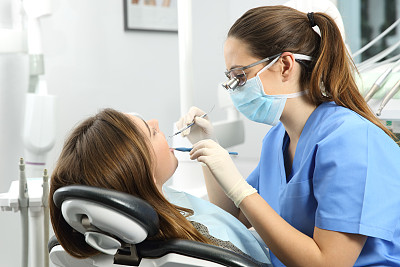Summary: Receiving a dental filling is a common procedure for restoring tooth function and preventing further decay. However, to ensure optimal oral health outcomes, both pre- and post-procedure precautions are essential. In this article, we will explore four critical aspects that patients should consider before receiving a dental filling: knowledge about the procedure, consultation with your dentist, maintaining oral hygiene, and ensuring a healthy diet. Additionally, we will discuss important post-procedure measures such as monitoring for discomfort, following care instructions, and scheduling follow-up appointments. By adhering to these precautions, patients can safeguard their oral health and promote effective healing.
1. Understand the Dental Filling Procedure

Before undergoing a dental filling, it is crucial for patients to have a clear understanding of what the procedure entails. This includes knowing about the materials used for fillings, such as composite resin, amalgam, or ceramic. Each material serves different purposes and has unique benefits and drawbacks, so being informed can help you make the best choice in consultation with your dentist.
Additionally, patients should familiarize themselves with the steps involved in the procedure. Dental fillings typically involve numbing the area surrounding the affected tooth, removing decay, and filling the cavity. Understanding these phases can alleviate anxiety and prepare patients for the appointment.
Lastly, asking your dentist any specific questions or expressing concerns about the procedure can be beneficial. This open communication helps build trust and ensures that patients fully understand what to expect, setting the stage for a more comfortable experience.
2. Consult Your Dentist Thoroughly
Consultation with your dentist plays a significant role in preparing for a dental filling. Before the procedure, you should discuss your dental history, including any allergies to materials and your previous experiences with dental treatments. This information allows the dentist to tailor the procedure to your needs and reduce potential complications.
Moreover, it鈥檚 essential to mention any medications you are currently taking, as certain drugs can influence the effectiveness of anesthesia or impact the healing process. By providing comprehensive details, patients can help their dentist make informed decisions that align with their health status.
Lastly, understanding the cost and payment options for your dental filling is crucial. Many dental offices offer flexible payment plans or financing options. Discussing these financial aspects can alleviate stress and enable you to focus on your oral health without the burden of unexpected costs.
3. Maintain Good Oral Hygiene Practices
Prior to a dental filling, maintaining good oral hygiene is essential. This includes brushing and flossing your teeth daily to reduce the likelihood of additional cavities and gum disease. A clean mouth can promote a smoother filling process and contribute to better overall oral health.
In addition to regular brushing and flossing, using an antibacterial mouthwash can help eliminate harmful bacteria. This step can further decrease the risk of infection following the filling procedure, thus enhancing the healing process.
Before your appointment, consider scheduling a professional cleaning session with your dentist. This will remove any stubborn plaque or tartar that may lead to complications during the filling procedure, ensuring an optimal environment for treatment.
4. Follow Post-Procedure Care Instructions
After receiving a dental filling, following your dentists care instructions is crucial for recovery. This typically includes avoiding certain foods that can be too hard or sticky, especially in the initial hours after the procedure. Adhering to these guidelines can prevent discomfort and prolong the lifespan of the filling.
Moreover, it鈥檚 essential to monitor for any symptoms post-treatment, such as prolonged sensitivity or discomfort around the filled tooth. If any issues arise, contact your dentist promptly to address these concerns before they escalate.
Finally, scheduling follow-up appointments is vital for ensuring the success of the filling. Regular check-ups allow your dentist to examine the filled tooth and monitor your overall dental health, confirming that everything is healing properly and functioning as intended.
Summary:
In conclusion, being aware of essential precautions before and after a dental filling can significantly enhance your oral health outcomes. By understanding the procedure, thoroughly consulting with your dentist, maintaining good oral hygiene, and diligently following post-care instructions, patients can ensure a smooth and effective dental treatment experience. Prioritizing these steps not only promotes healing but also cultivates lasting oral health.
This article is compiled by Vickong Dental and the content is for reference only.
Vickong Dental
Vickong Dental is a large medical group established in Hong Kong in 2008 by professors from well-known medical universities in Guangdong and Hong Kong, as well as medical doctors from key national '985' universities (including Master's supervisors and senior professors). The chain of branches brings together expert dentists with PhDs and Master's degrees from Hong Kong and Mainland China, committed to providing high-quality dental treatment.
"Vickong Dental Practices the University Motto of 'Healing and Serving Society,' with a Stable Operation for Sixteen Years. It Has Been honored with Hong Kong Enterprise Leaders's Choice,' and is a Global Trusted Implant Center for the Nobel Implant System. Recommended by Hong Kong Metro Broadcast and Guangdong Television, it Serves Customers from Over Thirty Countries and Regions, Gaining the Trust and Favor of Citizens from the Guangdong-Hong Kong-Macau Greater Bay Area and Surrounding Cities.

Thousands of customers' unanimous praise
The most recognized and highly recommended dental service by customers in the Guangdong-Hong Kong-Macau Greater Bay Area
We Ensure You Receive Detailed Care and Attention Here
Hong Kong standards, Shenzhen prices, Your Trusted English-speaking dentists

Vickong Dental Medical-Grade Instrument Disinfection Process
Vickong Dental Medical-Grade Instrument Disinfection Process

Vickong Dental Chain: A Warm and Comfortable Environment for Treatment






Appointment Hours

Q&A
Why choose Vickong Dental?
Vickong Dental practices the university motto 「Medicine to Benefit Society」, with each branch bringing together highly qualified dentists with doctoral and master’s degrees from Hong Kong and the Mainland, and has maintained seventeen years of steady operation。Recipient of 「2024 Hong Kong Enterprise Leaders Brand」, 「2025 Hong Kong Enterprise Leaders Brand」, a Nobel Biocare Global Trusted Implant Center, and a brand recommended by Metro Radio Hong Kong and Guangdong TV。
To date, we have served customers from more than thirty countries and regions,earning exceptionally high word-of-mouth recognition and trusted recommendations from residents across the Guangdong-Hong Kong-Macao Greater Bay Area and surrounding cities
We have eight major branches in Zhuhai、Shenzhen,and a consultation and service assurance center in Hong Kong,so you can book a free consultation at any time for any questions,which is very reassuring.
If I do not accept the quotation after the CT scan, will I be charged??
No! As long as the actual treatment has not started, you will not be charged any fees.
Will there be any additional charges during the treatment process?
No, there won’t be any additional charges. Before treatment begins, we will clearly explain the treatment plan and its corresponding fees. Only after the patient agrees and signs the consent form will we proceed with the dental service.
Can I pay in Hong Kong dollars?
Yes. Vickong Dental accepts payment in Hong Kong dollars. The amount will be converted based on the exchange rate of the day, and the applicable rate will be clearly communicated to you in advance.
Can I reschedule my appointment at any time?
Yes. Please contact us via **WeChat** or **WhatsApp** as early as possible, providing your original appointment time and details, along with your preferred new date and time slot for rescheduling.













